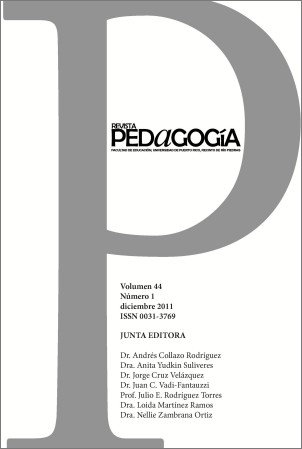Abstract
This paper documents the importance of figurative and metaphoric language as a tool for analysis and reasoning. Teaching figurative language should be an essential component of subject matter learning, as well as of other school activities. Given the social and cognitive capacities promoted by language, it must be a key dimension of education. This paper also examines the importance of metaphoric and creative use of language from a neurobiological perspective, and psychological and neurolinguistic fields. Learning figurative language gives way to student‘s thinking characterized by the construction of unique, critical and spontaneous ideas.
How to cite:
Álvarez-Pérez, H. J. (2011). El lenguaje como centro de la escolarización: Una visión desde la perspectiva de la neurobiología. Pedagogía, 44(1), 213-222. Retrieved from https://revistas.upr.edu/index.php/educacion/article/view/16568
References
Etchepareborda, M. C. & López-Lázaro, M. J. (2005). Estructura citoarquitectónica de las áreas del lenguaje. Revista de Neurología, 40 (Supl 1), 103-106.
Friederici, A. D. (2006). The neural basis of language development and its impairment. Neuron, 52, 941–952. DOI 10.1016/j.neuron.2006.12.002
Grijelmo, G. (2000). La seducción de las palabras: un recorrido por las manipulaciones del pensamiento. España: Santillana Ediciones Generales.
Kuhl, P. K. (2010). Brain mechanisms in early language acquisition. Neuron, 67, 713-727. DOI 10.1016/j.neuron.2010.08.038
Kuhl, P. K. (2005). A new view of language acquisition. Proceedings of the National Academy of Sciences, 97(22), 11850-11857.
Hauser, M.D., Chomsky, N. & Fitch, W. T. (2002). The faculty of language: What is it, who has it, and how did it evolve? Science, 298, 22.
Pinker, S. (2007). The stuff of thought: Language as a window into human nature. New York, N. Y.: Viking.
Tirapu-Ustárroz, J. & Muñoz-Céspedes, J. M. (2005). Memoria y funciones ejecutivas Revista de Neurología, 41(8), 475-484.
Vigliocco, G. (2000). Language processing: The anatomy of meaning and syntac. Current Biology, R78 – R80.
The contents published in the Puerto Rico Journal of Education is freely distributed under open access practices, in accordance with the Creative Commons license, Attribution-NonCommercial 4.0 International (CC BY-NC 4.0). Through these principles, the journal and its authors allow readers to access, reproduce and share articles in full text. Users should give credit to authors in a reasonable way without suggesting they have their support. Under no circumstances, readers may make use of the contents for commercial purposes. The authors retain copyright on their works.

